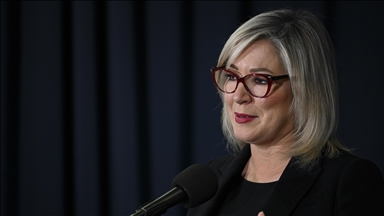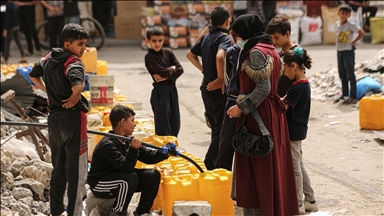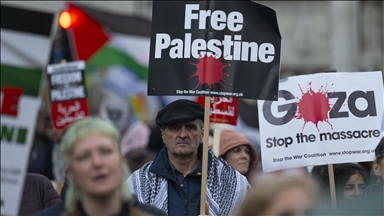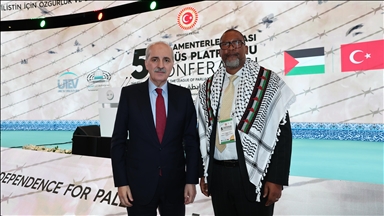Yasser Arafat’s legacy lives in Palestinian struggle for independence
Arafat continued to struggle for his people’s independence until his last breath
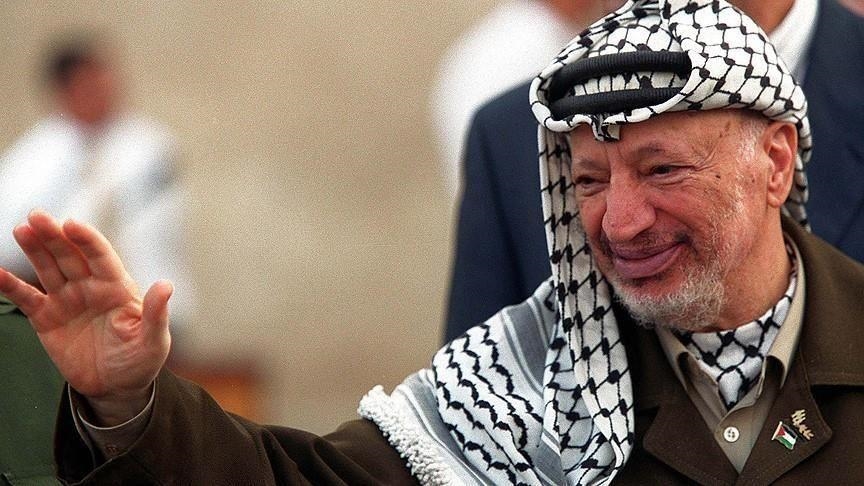
JERUSALEM
The legacy of Yasser Arafat, who devoted his life to the Palestinian liberation struggle, lives on 17 years after his death.
The anniversary of the death of Arafat, one of the most influential leaders in the region, coincided with the normalization of relations between Arab countries and Israel and the demotion of the Palestinian cause in the Arab-Islamic world.
Arafat, also known as Abu Ammar by Palestinians, wearing the traditional Palestinian keffiyeh and military fatigues, put forward a revolutionary stance and adopted different ways for the Palestinian liberation struggle.
Initially embracing that an armed struggle is the way to independence, he chose dialogue from the 1990s onwards.
Even though the ways he adopted were criticized by Palestinian groups, Arafat played a crucial role in the rise of the Palestinian cause and made it a major issue in global public opinion and the formation of Palestinian national identity.
He was regarded as one of the most important leaders in the Middle East and continued to struggle for his people’s independence until his last breath.
Arafat received the Nobel Peace Prize in 1994 but could not bring all pro-liberation Palestinian organizations under one roof. He, however, prevented a further deepening of the cleavages between organizations. His death played a role in the thickening of fractions between Palestinian groups.
A life devoted to Palestinian independence
Arafat argued that he was born in Jerusalem, the heart of the Palestinian struggle, in 1929. But some researchers claim he was born in the Egyptian capital of Cairo.
Having lost his mother when he was just 4, Arafat was raised by his older sister, Inam.
Starting to contribute to Palestinian resistance against Israeli occupation from an early age, he worked to provide arms to Palestinian fighters during the 1948 Arab-Israeli War.
Following the war, he went to Egypt to complete his studies and brought together Palestinian university students of various political affiliations and sympathies, who resided in the country through the Palestinian Student Union (PSU).
After completing his studies in civil engineering, he went to Kuwait where he established Fatah, formerly known as the Palestinian National Liberation Movement, in 1959.
Having revolutionary ideas, he opened the first branch of Fatah in Algeria in 1963.
Fatah, which adopted social democracy and pan-Arabism as its pillars, played a critical role in the Palestinian struggle against Israeli occupation.
Arafat saw Zionism as an aggressive, imperialist and fascist movement with its ideology, methods and organization.
He took over the leadership of the Palestine Liberation Organization (PLO) in 1969.
For liberating Palestinian lands from Israeli occupation, armed struggle is a must, he believed. Apart from Israel, the Palestinian resistance he led sometimes was compelled to fight Arab countries, including Jordan, where he left for Lebanon in 1971.
Against this background, he said: “Today, I have come bearing an olive branch and a freedom fighter's gun. Do not let the olive branch fall from my hand. I repeat do not let the olive branch fall from my hand,” in his speech in 1975 at the UN General Assembly.
As a result of Israeli attacks on Lebanon, where Arafat and the PLO were operating, in 1978 and then again in 1982, he was compelled to move to Tunisia in 1983.
On Nov. 15, 1988, the PLO proclaimed the independent State of Palestine with its capital in Jerusalem.
Following that, he announced he rejected violence as a means to achieve Palestinian independence and recognized Israel‘s right to exist the same year, one of the most decisive moves of his life.
Oslo Accords
From the early 1990s, Arafat and leading PLO officials engaged the Israeli government in a series of secret talks and negotiations that led to the 1993 Oslo Accords.
The agreement called for the implementation of Palestinian self-rule in portions of the West Bank and the Gaza Strip over a five-year period, along with an immediate halt to and gradual removal of Israeli settlements in those areas.
In 1994, Arafat moved to Gaza, which was controlled by the Palestinian National Authority (PNA) -- the provisional entity created by the Oslo Accords.
Growing Palestinian frustration and anger about Israel’s violations of the deal eventually paved the way for the Second Intifada in 2000.
In late 2004, after effectively being confined to his compound in Ramallah for more than two years by the Israeli army, Arafat, 75, fell into a coma and died.
The cause of Arafat's death has been a subject of speculation ever since.



